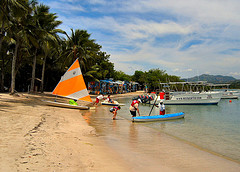Did you know that the Dominican Republic got its name from the fact that it was discovered on a Sunday?
The Dominican Republic is said to have come from the Latin word “dominus” meaning “lord”. The “Dominic” is usually the name given to a child born on a Sunday, which means “of the Lord”.
The Dominican Republic covers the eastern two-thirds of the Hispaniola Island, sharing it with Haiti. The island was discovered by Christopher Columbus in his journey in 1492 and was called La Espaniola.
Towards the end of the sixteenth century, the French obtained control over the Western part of the island but the Spanish still has its control over the Eastern portion. Around the end of the seventeenth century, the oldest city of the Americas, which was Santo Domingo, was turned over to the French, including the rest of the Hispaniola Island.
The 1808 battle of the Palonhicado signified the defeat of the French on its control over the Eastern part of the island. The colony was under Spanish regime again and Santo Domingo’s independence was proclaimed a few years after that.
Its independence, however, was not for long. The Haitians invaded the colony a year after the proclamation and was its occupants for 22 years. Fortunately, it recovered its dominion over the Haitians and independence was proclaimed once more, but this time as the Dominican Republic.

flickr.com/ronsaunders47
The Dominican Republic went through several years of civil war and dictatorship including that of General Rafael Trujillo from 1930 to 1961. His assassination brought civil unrest however President Joaquin Balaguer’s service of three-terms has brought stability to the country once more.
Guzman Fernandez won the presidential elections in 1978 but Balaguer fought and won four consecutive times for the office between 1986 and 1995. The string of protests and strikes fueled by crisis in late-1995 has made Balaguer step down from office and Leonel Fernandez took the Presidency in 1996.
Balaguer still fought to regain office despite his health condition in May 2000, but Hipolito Mejia won the elections. Two months after that, Balaguer, who ruled the Dominican Republic’s politics for seven terms died at the age of 95.
Leonel Fernandez regained the Presidency in the 2004 elections, carrying the promise of a better Dominican Republic. Indeed, the Dominican Republic’s history is as interesting as what the country has to offer to its guests.
|
Learn how you can save a boatload of money on every cruise you take |
Today, the government of the Dominican Republic has to live up to a lot of expectations following several years of unsatisfactory governance. Fortunately, it has been found out that the economy this year has increased – paving the way for more reasons to visit.
Tagged with: family travel • the dominican republic
Filed under: Travel -- Caribbean